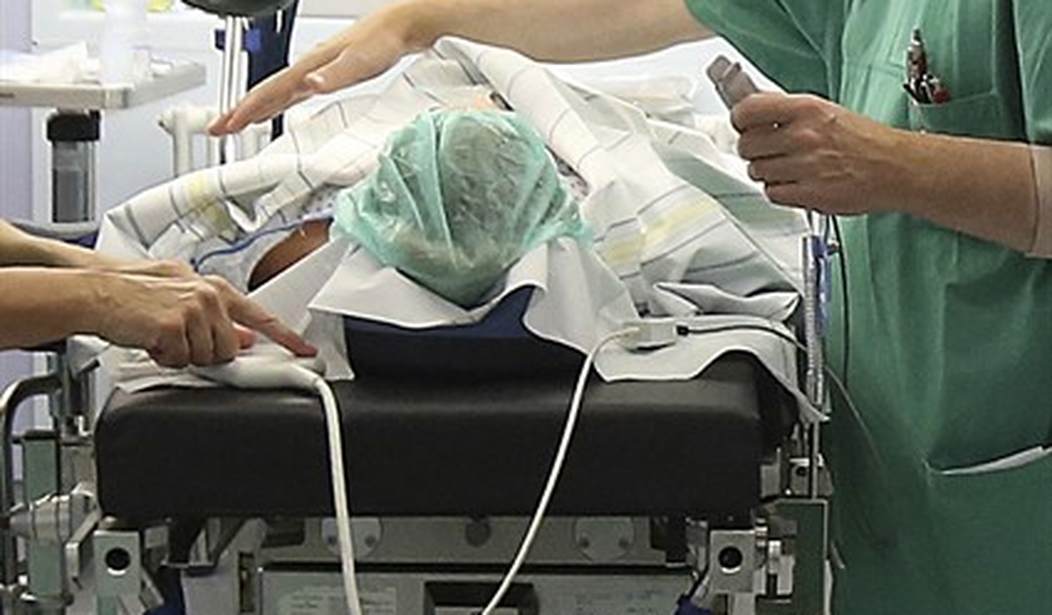When you hear the term “medical ethicist,” you should just assume that the person is a ghoul who should be committed to an institution.
After spending far too much time reading the bizarre writings of scientists and philosophers, that is my conclusion. Perhaps there are some decent human beings with a conscience in the profession, but I challenge you to find one. If you do, send them my way to reassure me that humanity is not doomed.
The latest outrage is from a piece in Theoretical Medicine and Bioethics, a journal that publishes the musings of ethicists considering the medical technology of the future. It envisions a future that could only exist in a dystopian science fiction movie.
The author Anna Smajdor is from the University of Oslo in Norway, where I imagine she contemplates the future in a Brutalist building that looks like it could survive a nuclear attack. She imagines a future where doctors use brain-dead, donated bodies as gestational homes for babies essentially ordered up from people seeking a designer child.
Whole body gestational donation offers an alternative means of gestation for prospective parents who wish to have children but cannot, or prefer not to, gestate. It seems plausible that some people would be prepared to consider donating their whole bodies for gestational purposes just as some people donate parts of their bodies for organ donation. We already know that pregnancies can be successfully carried to term in brain-dead women. There is no obvious medical reason why initiating such pregnancies would not be possible. In this paper, I explore the ethics of whole-body gestational donation. I consider a number of potential counter-arguments, including the fact that such donations are not life-saving and that they may reify the female reproductive body. I suggest if we are happy to accept organ donation in general, the issues raised by whole-body gestational donation are differences of degree rather than substantive new concerns. In addition, I identify some intriguing possibilities, including the use of male bodies–perhaps thereby circumventing some potential feminist objections.
I…just don’t know where to begin.
We have moved so far down the path of accepting the notion that human beings are commodities to be used and traded that the concept of using brain-dead people as wombs is a concept that can be seriously proposed and debated in a medical ethics journal.
And yet, the author does have a serious point: we have moved very far down this path, and what precisely stops us from moving further along it?
Human life is now just another commodity, because we have decided at some point that there is no inherent dignity to our person or our body. We see this in the abortion debate, the Medical Assistance in Dying debate, and in the debate that still rages over surrogacy and different types of adoption.
In the modern world–or should I say the post-Christian/post-religious world–human dignity entirely depends upon the attitudes of people who surround you. Only certain people, of course, as defined by some form of credentialism endorsed by the powers that be. Under no circumstances, though, is the worth of a human life or human body inherent to something higher than human judgment.
In 2000, Rosalie Ber advanced a novel suggestion for circumventing the moral problems of gestational surrogacy. She proposed that female patients in a persistent vegetative state (PVS) who had given prior written consent, could function as surrogates: embryos would be placed in the woman’s uterus and gestated to term [1]. To my knowledge, no jurisdiction has considered implementing Ber’s suggestion. This is surprising, given the degree to which surrogacy continues to provoke moral and legal controversy [2,3,4,5].
Ber does not give a name to the phenomenon she proposes; for the purposes of this paper, I use the term ‘whole body gestational donation’ (WBGD). Although my initial interest in this area was sparked by Ber’s work, I have adapted and extended her approach in three important ways that have both practical and normative implications, meaning that WBGD in my usage is not precisely the same phenomenon that she discusses in her paper.
- Ber’s view is that women in PVS would offer the best alternative to living surrogacy. I suggest that we should be willing to consider WBGD in patients who are brain stem dead rather than in PVS (and would therefore be eligible to be organ donors).
- Ber believes that WBGD should be available only to the patients deemed to have a clear medical need for it. I suggest that – all other things being equal–it should be an option for anyone who wishes to avoid the risks and burdens of gestating a foetus in their own body.
- Ber implicitly accepts that only women can gestate. I suggest that brain stem dead men would also have the potential to gestate, meaning that the pool of potential donors is further increased – and that certain feminist concerns might thus be assuaged.
In what follows, I will show why my adapted and extended version of WBGD offers a solution to the problems of surrogacy. I suggest that states and health services should adapt their policies and procedures to allow for WBGD among other donation options. I address some possible objections and show that although the prospect of WBGD may be disconcerting, most of the ethical problems that might be associated with it apply equally to other areas of medical and/or reproductive practice.
Unfortunately, once you move down the materialist path where human life is simply biological existence, there is no clear place to stop and look around. That is why Canada’s Medical Assistance in Dying program zipped in record time from “let’s find alternatives to dying a horribly painful death when the end is nigh” to “let’s kill off the poor.” The ethical distance is shorter than we think, at least if you leave God out of the equation.
And of course we could adapt MAID into a program where we harvest bodies to use as “whole-body gestational donors!” A whole new source of wombs!
Having grown up in an atheist household, surrounded by atheist and agnostic scientists, I am aware that there are good and decent people whose attitudes toward human life and ethics differ from mine while remaining admirable.
But it’s hard to see how one can be a materialist and argue against using other human beings as resources to be used and disposed of. That’s why we find so many abortion proponents whose definition of a human life boils down to “a person is somebody who I want to be alive.” The same fetus can be a person or not entirely based upon the desires of another.
If one does not have dignity and rights “endowed by our creator,” then how, precisely, do we acquire those rights? The alternative is simply the agreement of others.
That’s a weak reed to uphold human rights.
No doubt Anna Smajdor’s suggestion will be met with scorn by most people…today. But in 5 years? 10?
Who would have guessed that a few years after Canada legalized MAiD they would extend it to killing people who are poor, or children who are depressed? Yet they have.
This, too, will come. Maybe not today. Maybe not tomorrow. But sometime soon.
Because we have no philosophical reason to stop it besides disgust. That disgust may be based upon a moral instinct, but moral instincts have never stopped human desire or pecuniary interests in the past.
We speed beyond moral limits daily, into a new transhumanist dystopia. Sadly, many people look forward to this future.








Join the conversation as a VIP Member